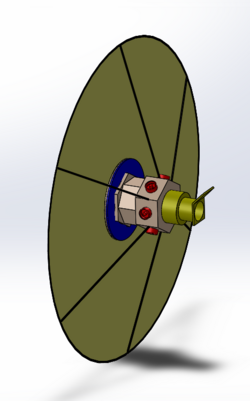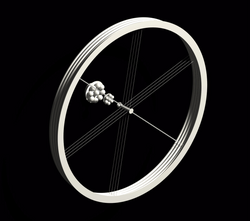Organization:Initiative for Interstellar Studies
 i4is logo | |
| Abbreviation | i4is |
|---|---|
| Formation | 2012 |
| Founders | Kelvin F. Long, Rob Swinney |
| Legal status | Incorporated in the UK as a not-for-profit company limited by guarantee |
| Purpose | To conduct activities or research relating to the challenges of achieving robotic and human interstellar flight. |
| Location |
|
Region served | World |
Membership | Astronautical engineers Astrophysicists |
Executive Director | Andreas M. Hein |
Main organ | Principium |
| Website | www.i4is.org |
| Remarks | See also the i4is blog |
The Initiative for Interstellar Studies (i4is) is a UK-registered not-for-profit company, whose objectives are education and research into the challenges of Interstellar Travel.[1] It pioneered concepts of small-scale laser sail interstellar probes (Project Dragonfly) and missions to interstellar objects (Project Lyra). Several of its principals were involved in the 100 Year Starship winning team originated by NASA and DARPA.[2]
The US activities of i4is are coordinated by the Institute for Interstellar Studies, a not-for-profit registered in Tennessee, USA.
Notable projects and activities

i4is has initiated a project working on small interstellar spacecraft, propelled by a laser sail in 2013 under the name of Project Dragonfly.[3][4] Four student teams worked on concepts for such a mission in 2014 and 2015 in the context of a design competition.[5][6][7][8][9] The design of the team from the University of California, Santa Barbara, has subsequently been selected as the baseline system architecture for Breakthrough Starshot. A subsequent study, Project Andromeda, has provided input to Breakthrough Starshot prior to its announcement in 2016.[10][11][12]
Project Lyra: In November 2017, i4is launched Project Lyra and proposed a set of mission concepts for reaching the interstellar objects 1I/ʻOumuamua, 2I/Borisov, and yet to be discovered objects.[13][14][15][16] The project has been featured in numerous media outlets.[17][18][19][20][21][22]
World and Generation Ships:

i4is has published on world ships, large interstellar generation ships and has presented its results at the ESA Interstellar Workshop in 2019 as well as in ESA's Acta Futura journal.[24][25][26] In 2024, the Project Hyperion design competition was launched.[27][28][29][30]
Venus astrobiology mission: Subsequent to the alleged discovery of phosphine in the Venusian atmosphere in 2020, i4is published a study on a dedicated astrobiology mission, based on a fleet of balloons to probe the Venusian atmosphere.[31][32]
Principium: The i4is publishes a quarterly newsletter, Principium.[33]
Prominent figures
A number of internationally renowned primarily British academics and engineers have had oversight and involvement with the work of the i4is -
- Freeman Dyson FRS, theoretical physicist and mathematician, professor emeritus Institute for Advanced Study was a member of the Advisory Council of the i4is
- Alan Bond, Managing Director of Reaction Engines Limited, is a consultant to i4is.
- Ian Crawford, Professor of Planetary Science and Astrobiology at the Department of Earth and Planetary Sciences, Birkbeck College, University of London[34] is a member of the Advisory Council of the i4is
- Gregory L. Matloff, professor New York City College of Technology[35] is Chair of the Advisory Council of the i4is.[36]
References
- ↑ “The Institute for Interstellar Studies”, Spaceflight (magazine), Editorial, Vol.54, No.12, p.445, December 2012, by David Baker
- ↑ "100 Year Starship". DARPA. http://www.darpa.mil/NewsEvents/Releases/2011/2011/02/09_100-Year_Starship_Study_Strategic_Planning_Workshop_Held.aspx.
- ↑ “Project Dragonfly”, i4is.org/news/dragonfly
- ↑ "Project Dragonfly: The case for small, laser-propelled, distributed probes". http://www.centauri-dreams.org/?p=31478.
- ↑ Perakis, Nikolaos; Schrenk, Lukas; Gutsmiedl, Johannes; Koop, Artur; Losekamm, Martin J (2016). "Project Dragonfly: A feasibility study of interstellar travel using laser-powered light sail propulsion". Acta Astronautica 129: 316–324. doi:10.1016/j.actaastro.2016.09.030. Bibcode: 2016AcAau.129..316P.
- ↑ Häfner, Tobias; Kushwaha, Manisha; Celik, Onur; Bellizzi, Filippo (2019). "Project Dragonfly: Sail to the stars". Acta Astronautica 154: 311–319. doi:10.1016/j.actaastro.2018.05.018. Bibcode: 2019AcAau.154..311H.
- ↑ "Project Dragonfly - Sail to the Stars". 10 October 2016. http://kickstarter.com/projects/1465787600/project-dragonfly-sail-to-the-stars.
- ↑ "Project Dragonfly: Design Competitions and Crowdfunding". http://www.centauri-dreams.org/?p=33025.
- ↑ Cain, Fraser (6 January 2019). "Project Dragonfly. A Laser-Powered Probe to Alpha Centauri". https://www.youtube.com/watch?v=598UtgxFd1E.
- ↑ Moody, Oliver. "Tiny armada to explore space". The Times. https://www.thetimes.com/article/tiny-armada-to-explore-space-alpha-centauri-initiative-for-interstellar-studies-vauxhall-f2bkl22q5.
- ↑ Emerging Technology from the arXiv. "Femto-Spacecraft Could Travel to Alpha Centauri". https://www.technologyreview.com/2017/08/31/149377/femto-spacecraft-could-travel-to-alpha-centauri/.
- ↑ Hein, Andreas M; Long, Kelvin F; Fries, Dan; Perakis, Nikolaos; Genovese, Angelo; Zeidler, Stefan; Langer, Martin; Osborne, Richard; Swinney, Rob; Davies, John (2017). "The Andromeda Study: A Femto-Spacecraft Mission to Alpha Centauri". arXiv:1708.03556 [astro-ph.IM].
- ↑ Hein, Andreas M.; Perakis, Nikolaos; Eubanks, T. Marshall; Hibberd, Adam; Crowl, Adam; Hayward, Kieran; Kennedy III, Robert G.; Osborne, Richard (7 January 2019). "Project Lyra: Sending a spacecraft to 1I/'Oumuamua (former A/2017 U1), the interstellar asteroid". Acta Astronautica 161: 552–561. doi:10.1016/j.actaastro.2018.12.042. Bibcode: 2017arXiv171103155H. https://www.sciencedirect.com/science/article/abs/pii/S0094576518317004.
- ↑ Hibberd, Adam; Perakis, Nikolaos; Hein, Andreas M. (13 September 2019). "Sending a Spacecraft to Interstellar Comet C/2019 Q4 (Borisov)". Earth and Planetary Astrophysics.
- ↑ Hibberd, Adam; Hein, Andreas M (2021). "Project Lyra: Catching 1I/'Oumuamua-Using Nuclear Thermal Rockets". Acta Astronautica 179: 594–603. doi:10.1016/j.actaastro.2020.11.038. Bibcode: 2021AcAau.179..594H. https://www.sciencedirect.com/science/article/abs/pii/S0094576520307141.
- ↑ Hibberd, Adam; Hein, Andreas M; Eubanks, T Marshall (2020). "Project Lyra: Catching 1I/'Oumuamua--Mission Opportunities After 2024". Acta Astronautica 170: 136–144. doi:10.1016/j.actaastro.2020.01.018. Bibcode: 2020AcAau.170..136H. https://www.sciencedirect.com/science/article/abs/pii/S0094576520300291.
- ↑ Powell, Corey S. (17 October 2019). "Visitors from deep space are buzzing our solar system. The race is on to explore them". https://www.nbcnews.com/mach/science/visitors-deep-space-are-buzzing-our-solar-system-race-explore-ncna1065851.
- ↑ Greshko, Michael (4 October 2019). "Interstellar comet starts coming into focus". https://www.nationalgeographic.com/science/2019/10/interstellar-comet-borisov-starts-coming-into-focus/.
- ↑ Oberhaus, Daniel. "Should Earthlings Chase 'Oumuamua Into Interstellar Space?". Wired. https://www.wired.com/story/should-earthlings-chase-oumuamua-into-interstellar-space/?fbclid=IwAR3vyWrALMbvbj9Ytzj1F-SP3L7MVgYQbpqfDRQQHdJhccZuNaNgsotWX5U. Retrieved 14 February 2021.
- ↑ Powell, Corey S. (28 January 2019). "What is Oumuamua? Here's what we know about the interstellar object". https://www.nbcnews.com/mach/science/what-oumuamua-here-s-what-we-know-about-interstellar-object-ncna963656.
- ↑ Williams, Matt. "Could we intercept interstellar comet C/2019 Q4 Borisov?". https://phys.org/news/2019-09-intercept-interstellar-comet-c2019-q4.html.
- ↑ Ciaccia, Chris (20 September 2019). "Newly discovered interstellar visitor could be intercepted, study says". https://www.foxnews.com/science/new-interstellar-visitor-could-be-intercepted.
- ↑ Hein, Andreas M.; Pak, Mikhail; Pütz, Daniel; Bühler, Christian; Reiss, Philipp (2012). "World ships—architectures & feasibility revisited". Journal of the British Interplanetary Society 65 (4): 119. https://www.researchgate.net/publication/236177990.
- ↑ Hein, Andreas M; Smith, Cameron; Marin, Frederic; Staats, Kai (2020). "World Ships: Feasibility and Rationale". Acta Futura 12: 75–104. doi:10.5281/zenodo.3747333.
- ↑ Faife, Corin (17 December 2019). "Scientists Are Contemplating a 1,000-Year Space Mission to Save Humanity". https://onezero.medium.com/scientists-are-contemplating-a-1-000-year-space-mission-to-save-humanity-70882a0d6e47.
- ↑ Hein, Andreas M; Smith, Cameron; Marin, Frédéric; Staats, Kai. "World Ships –Feasibility and Rationale". https://indico.esa.int/event/309/attachments/3517/4683/World_Ships_-_Andreas_Hein.pdf.
- ↑ Feehly, Conor (5 November 2024). "Design an Interstellar 'Generation Ship' to Spend Decades Among the Stars with Project Hyperion Competition". https://www.space.com/space-exploration/tech/design-an-interstellar-generation-ship-to-spend-decades-among-the-stars-with-project-hyperion-competition.
- ↑ Harris, Bob McDonald (8 November 2024). "Contest Invites Teams to Design a 'Generation Starship' for a 250-Year Journey". https://www.cbc.ca/radio/quirks/generation-starship-contest-1.7378039.
- ↑ Szondy, David (15 November 2024). "Spaceship Architects Asked to Design Star-Hopping Generation Ships". https://newatlas.com/space/spaceship-architects-generation-ships-competition/.
- ↑ Williams, Matt (11 November 2024). "Project Hyperion Is Seeking Ideas for Building Humanity's First Generation Ship". https://www.universetoday.com/169223/project-hyperion-is-seeking-ideas-for-building-humanitys-first-generation-ship/.
- ↑ Dorminey, Bruce. "Proposed Venus Balloon Mission Could Detect Life By 2022". Forbes. https://www.forbes.com/sites/brucedorminey/2020/09/28/low-cost-privately-funded-balloon-mission-could-scope-out-venus-life-by-2022/?sh=a2fab0217064.
- ↑ Hein, Andreas M; Lingam, Manasvi; Eubanks, T Marshall; Hibberd, Adam; Fries, Dan; Blase, William Paul (2020). "A Precursor Balloon Mission for Venusian Astrobiology". The Astrophysical Journal Letters 903 (2): L36. doi:10.3847/2041-8213/abc347. Bibcode: 2020ApJ...903L..36H.
- ↑ "Principium". i4is. http://www.i4is.org/Publications/Principium.
- ↑ "Dr Ian Crawford". Birkbeck College, University of London. http://www.bbk.ac.uk/geology/our-staff/ian-crawford/.
- ↑ "Gregory L. Matloff". New York City College of Technology. https://www.citytech.cuny.edu/aboutus/scholars/bios/matloff.shtml/.
- ↑ "I4IS - Senior Advisory Council". http://www.i4is.org/people_council.html.
External links
- British Interplanetary Society website
- Journal of the British Interplanetary Society
- International Space University
- 20 minutes talk by Chris Welch about The Institute for Interstellar Studies during SpaceUp Stuttgart 2012 (YouTube Video)
 |
